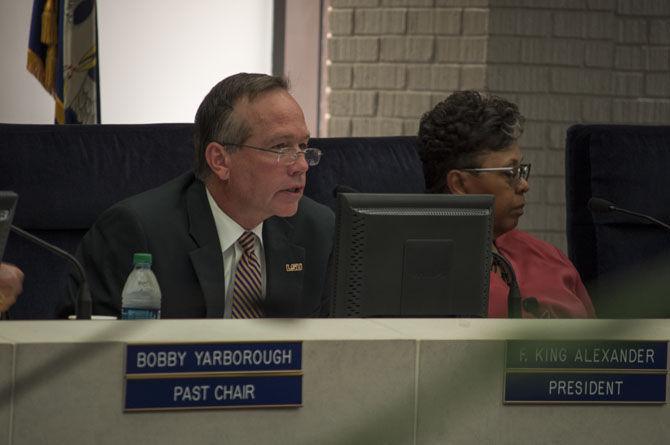LSU President F. King Alexander said the effects of budget cuts could be felt as early as this semester, even though faculty are in the classroom and student fees are already paid.
At an LSU Board of Supervisors meeting Friday, Alexander said a loss of $65 million in spring 2016 alone could result in a $700 per student increase and a program excellence fee at some point this semester.
Alexander said the actions the University, alongside Commissioner of Administration Jay Dardenne and the state government, will have to take in the next four months will be “unprecedented.”
“We can only respond in a couple of ways,” he said. “We are already more than midway through what we had planned and what we are doing … We’ve been living in the now for too long.”
Other shortcomings the University faces include a 12 percent reduction in undergraduate enrollment, a massive elimination of summer programs and the loss of 135 faculty lines, contributing to the 222 that were enumerated over the last 7 years.
Off-site facilities such as Pennington Biomedical Research Center face financial exigency, Alexander said, and five of the LSU agriculture sites throughout the state risk permanent closure.
“We knew in June that we were buying breathing time, but now that time is up,” Alexander said. “I can’t tell you how serious these tests are … This is a 64 percent reduction if you annualize the 32 percent hit we are taking this semester … You won’t find this in any other newspaper in any other part of the country.”
Dardenne told the Supervisors the special legislative session beginning Feb. 14 has to be the start of the state’s short-term economic fix in order to aid the long-term restructuring of the state budget.
“If we coddle this year, we will coddle next year,” he said, referencing the $750 million shortfall in revenue for the current fiscal year ending June 30 and the mid-year cuts Louisiana may have to make.
According to Dardenne, Gov. John Bel Edwards has proposed to use $128 million of the Rainy Day — or budget stabilization — fund and to redirect $200 million paid by British Petroleum for non-coastal damages by the state to somewhat alleviate the budget crisis.
However, Dardenne said the selected revenue generating remedies will not affect the current fiscal year. The structural changes, though, will affect everyone in the state.
“There won’t be any more make believe in the state budget,” he said. “People will know how much we have, and they will have to get used to hearing the truth and the reality of it … it’s not an easy solution to find $750 million with only 3 months left.”





